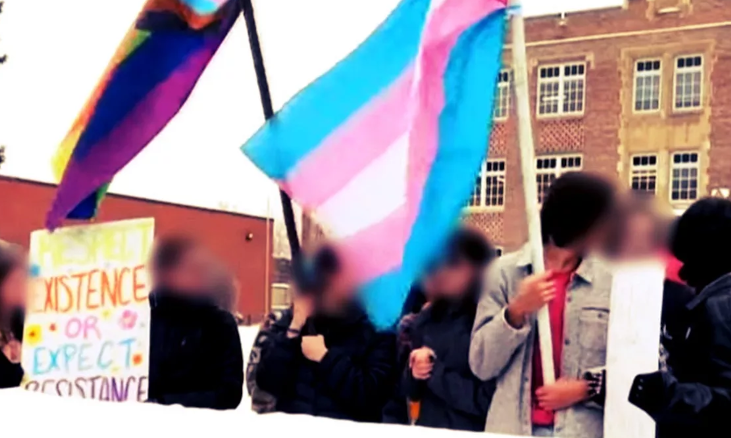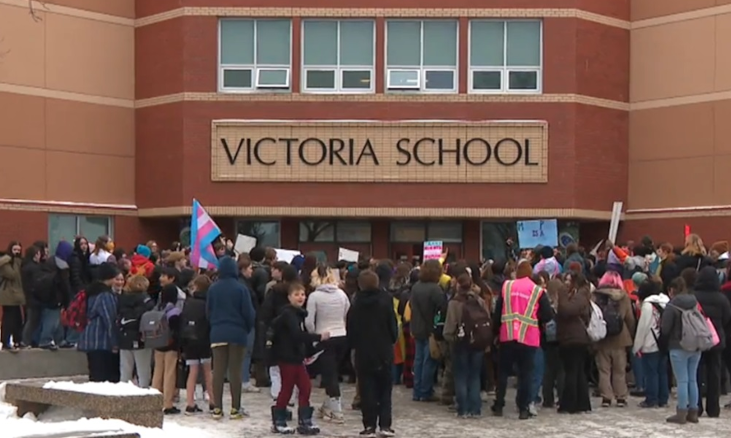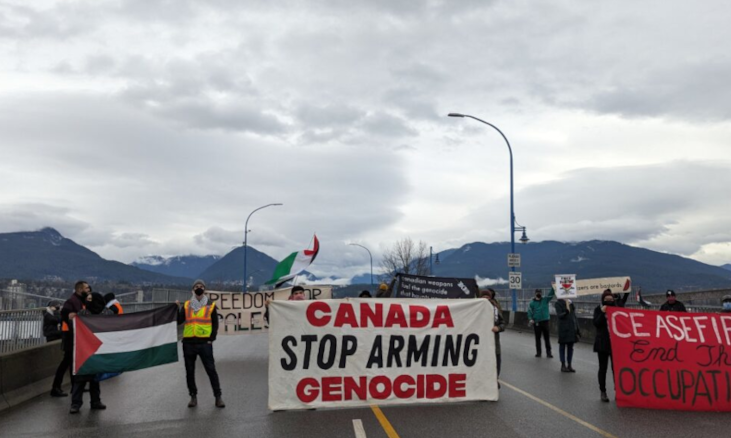From Canadian Tire Fire
In today’s column, we take a look at the forms of resistance taking shape against Quebec’s Northvolt battery plant. We also look at responses to new anti-trans legislation in Alberta, and statistics around pre-trial detention in Ontario. Finally, we provide a roundup of Palestine solidarity actions and news over the last month.
Resistance to Quebec’s Northvolt Battery Plant
In January, opponents of a huge electric vehicle battery plant project 30km east of Montreal targeted the construction project through a number of channels. The plant, owned by Swedish company Northvolt, would see 1.4 square kilometers of wetlands and woodlands razed. The project threatens an area that “is home to a diverse fauna (bats, birds, amphibians, turtles, snakes, etc.), including several species classified as “threatened” or “endangered.”
One of several developments in the fight against the plant was a tree-spiking action claimed on Montreal- Counter-Info. A communique for the action claims: “We have taken the initiative to oppose this deforestation by inserting steel bars and nails into the trunks of trees endangered by the plant. While having minimal impact on the health of the trees, these pose a significant risk to heavy machinery.” As the writers explain: “The Saint-Basile-le-Grand plant project is an integral part of “Projet Saint-Laurent”, an economic development strategy championed by [Quebec Premier] François Legault that aims to transform the St. Lawrence Lowlands into a kind of Quebec Silicon Valley, focusing on “innovation zones.”
In addition to this disruptive action, other groups have made their opposition known as well. In mid-January, a local environmental group, the Centre québécois du droit de l’environnement (CQDE), filed an injunction request, calling for the work to stop. While the work was temporarily halted pending the legal proceedings, a Quebec Superior Court judge dismissed the injunction on January 25th, saying he was unsatisfied with the arguments against the validity of permits and authorization for the work. The judge did acknowledge “the destructive nature of the plant’s construction on wetlands but said the company had taken steps to make up for it, such as a $4.7-million investment in restoring other wetlands, as well as a commitment to planting 24,000 trees for the 8,730 living trees it would be cutting at the site and the removal of 5,365 dead ones.”
Meanwhile, in late January, Mohawk Council of Kahnawà:ke (MCK) filed a lawsuit with the Quebec Superior Court against the federal and provincial governments. In a news release, MCK argued the governments failed to consult the community on Northvolt’s future electric vehicle battery plant. According to the release, “the MCK is also challenging the legislation that governs work in wetlands, arguing that these laws fail to consider, let alone respect, Indigenous rights.”
In early February, protestors from a wide range of groups marched through McMasterville, Que., on Montreal’s South Shore, in opposition to the project. Many present called for an independent environmental assessment of the project, demanding this be done before the work proceed. Last year, the Premier announced that the project would not be subject to an evaluation by the Bureau d’audiences publique sur l’environnement (BAPE) as it was just below the 60,000 tonne obligatory review threshold for cathode manufacturing, sitting at 56,000 tonnes. Project opponents pointed out the arbitrary and risky nature of this decision however, given this threshold was raised only a year ago from 50 000 tonnes.
We’ll be keeping an eye on this developing struggle, as a wide range of groups will surely continue to fight against the project for months if not years to come.
New Data Shows 82% of Ontario Prisoners Awaiting Trial
A new statistic released by CTV News following a Freedom of Information Request found that in 2023, on the average day in Ontario, 82% of incarcerated people were legally innocent and awaiting trial. These numbers are among the most stark in Canada, though, from available data, other provinces are not far behind – in the fall of 2023, the Globe and Mail reported that 77% of prisoners in Alberta and 74% in B.C. were awaiting trial. These numbers were up from 63% five years prior in both provinces.
This new statistic was released just weeks after new federal legislation came into effect making it harder for prisoners to get bail – a change that is likely to push pre-trial detention numbers even higher in the future. In reality, prisoners in pre-trial detention face some of the worst conditions in Canada’s jails including shorter visits and almost no access to programs and services. The effects holding more people before trial is certain to further perpetuate cycles of trauma and harm intrinsically tied to Canada’s prison system.
Student Walkouts Resist Anti-Trans Legislation in Alberta
On January 31st, Alberta Premier Danielle Smith announced a new suite of policies related to gender-affirming care. The legislation includes banning youth aged 15 and under from accessing puberty blockers and hormone therapy, requiring parental notification if kids want to use a different name or pronoun at school, and banning trans women and girls from participating in women’s sports. The policies also ban top and bottom surgery for youth aged 17 and under, although bottom surgery is already not performed on people under 18 anywhere in Canada – a signal of the disingenuousness of these policies.
Youth in Alberta were quick to respond, staging a province-wide school walkout on February 7. Early estimates reported that at least 2,000 students took part in the action. Hundreds also protested outside the Alberta legislature. A solidarity demo was also held in Ottawa when Danielle Smith visited to open a new office on February 6, and the next day in Toronto when she attended a private dinner.
Palestine Solidarity Actions Continues
Solidarity actions with Palestinians facing genocide in Gaza continued over the past month.
On February 1st, two entrances to the Port of Vancouver were blocked for a day, stopping the flow of $3-billion worth of trade. Protesters called for an immediate arms embargo on Israel and a number of port workers and truck drivers joined in the action.
In Toronto, protesters occupied the office of Awz, a Canadian-Israeli venture capital firm that invests in Israeli security and intelligence.
In Kitchener-Waterloo, a Magellan Aerospace plant was blockaded. The company manufactures parts that are supplied to Lockheed Martin.
In Newfoundland, a protest was held at Kraken Robotics, an manufacturer supplying underwater sonar technology to Israeli weapons manufacturer Elbit systems.
Meanwhile, thousands continue to show up for regular marches and demonstrations, targeting politicians, financial districts, and Israeli consulate buildings.
In BC, some recent actions have focused on MLA Selina Robinson, who, in a webinar with B’nai Brith Canada called Palestine before 1948 a, “Crappy piece of land with nothing on it.” Her words prompted swift calls for her resignation, and, after a hollow apology from Robinson and inaction from BC Premier David Eby, calls escalated to protest. Protesters showed up at NDP events including a party retreat in Surrey, and a group of mosques and Islamic organizations announced that NDP MLAs and candidates would not be welcome on their properties until action was taken. Robinson’s office was also vandalized. Six days after the webinar, she announced she would be stepping down from her role as Post-Secondary Education Minister.
As protests continue, so does police repression. In late January, Toronto police conducted a house raid and arrested two people in connection with a protest that had taken place in a downtown mall one month earlier. On February 9th, they announced that one person’s charges had been dropped, and that one new person had been arrested in connection with the incident.
In Toronto, demonstrating on overpasses has emerged as a popular tactic for Palestine supporters. One overpass, located near a predominantly Jewish neighbourhood, has become a site of controversy as groups including B’nai Brith criticized the choice of location. After approximately a month of protests, Toronto police banned protests on the overpass, and made three arrests at the following demonstration. Toronto police also announced that they would be applying a ‘criminal lens’ to future Palestine-related protests throughout the city.
In other cities, police have also demonstrated an intent to criminalize and discourage protest. In Ottawa, police have routinely begun ticketing protesters for the use of megaphones, and taking the extra step of visiting organizers’ homes to issue tickets.
Follow Canadian Tire Fire on Mastodon here.





